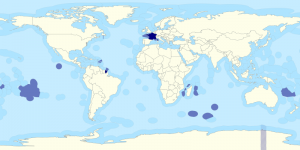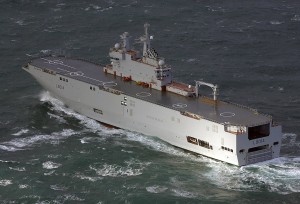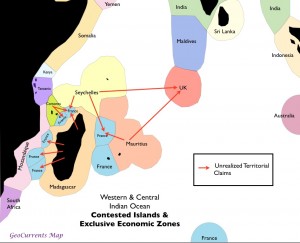 The announcement that Japan and France are strengthening their military ties should come as no surprise to Pacific-watchers. Both countries have a goodly amount in common, and, though some people will scoff, this relationship will be a good thing for the Pacific and Indian Oceans.
The announcement that Japan and France are strengthening their military ties should come as no surprise to Pacific-watchers. Both countries have a goodly amount in common, and, though some people will scoff, this relationship will be a good thing for the Pacific and Indian Oceans.
Let’s be frank…In Pacific and Indian Ocean Affairs, France gets something of a short shrift. Sure, France’s once-grand colonial holdings in Asia and Africa have faded, and budget deficits are eating away at France’s ability to project substantial military power. The French even get giggled about in maneuvers and exercises. But–as I have been screaming about since 2008 or so–let’s not underestimate the potentially stabilizing influence this decidedly independent–yet decidedly Western-leaning NATO member can wield in the Pacific and Indian Oceans.
Remember, France–probably more than anybody else out there–wants stability. France still holds a substantial amount of global real estate–resource-rich, strategically-placed outposts that would be hard to secure if pressed. France also controls the second-largest EEZ in the world–4.2 million square miles of seafloor–economically valuable holdings that it wants respected.
France cannot look at the South China Sea, and observe China’s demonstrated tendency to appropriate lightly-held territories and sea-features without some measure of unease–after all, it has some contested and lightly-held EEZs itself.
 In pursuit of stability, Paris certainly has some cards to play in the Pacific and Indian Ocean theatres. Despite NATO status and a troublesome record as a former colonial power, France is still seen as a relatively independent nation, willing to buck US leadership. It is also quite diplomatically savvy, and, via cultural ties to former colonies in the Asia-Pacific region and beyond, could be seen as something of an honest broker, a dis-interested third party that is well-positioned to help mediate Pacific disputes.
In pursuit of stability, Paris certainly has some cards to play in the Pacific and Indian Ocean theatres. Despite NATO status and a troublesome record as a former colonial power, France is still seen as a relatively independent nation, willing to buck US leadership. It is also quite diplomatically savvy, and, via cultural ties to former colonies in the Asia-Pacific region and beyond, could be seen as something of an honest broker, a dis-interested third party that is well-positioned to help mediate Pacific disputes.
In addition, France holds strategically-placed islands in the Pacific and Indian Oceans that would be perfect for certain transient military activities or to serve as a host for even larger bases of the Diego-Garcia type.
And finally, France has naval, aviation and strike technology that some Pacific countries might find rather useful–subs, amphibious assault tech, nuclear technology and SLBM know-how. With Russia sailing a France-built Mistral out of Vladivostok sometime in the not-so-distant future, Chile and Malaysia floating Scorpenes, and Chile eyeing a second Foudre Class LPD (and who knows what other assorted strategic cast-offs may end up in South America or near the South China Sea), France may, in time, be supporting–in one way or another–a fairly robust portfolio of Pacific-based maritime power projection assets that, oh, you know, naturally work very well with the French Fleet.
Japan can offer France a pretty good market. Take in-theatre mobility–CNIM’s high-tech, scalable L-CATs might be a perfect fit to grant Japan’s Army rapid power-projection capabilities to their islands “near abroad” (The L-CATs certainly have that high-tech “buzz” that Japan seems to like and does quite well operating).
France might even help re-focus Japan’s nuclear engineers–who sure aren’t working on expanding Japan’s land-based nuclear power infrastructure–towards nuclear-propulsion projects. France and Japan might work together on second-strike capabilities or other basing/infrastructure ventures, particularly as China starts working into the deeper Pacific.
 Outside of arms sales and technical collaboration, the idea of a stronger relationship between Japan and France resonates on a number of different levels. Both share somewhat controversial records as former Asian colonial powers that they are eager to put behind them. Both are engaging more in Peacekeeping efforts to raise their international profile. And, most importantly, they may share some concerns about China. Like Japan, France may be growing concerned at China’s bare-knuckled competition for marketshare and influence in Africa and other traditionally French-dominated areas (Cough..New Caledonia? Tahiti? Cough, cough..). Japan’s ample logistical support capabilities may also help drive mutual collaborations as France continues the gallant struggle to maintain cost-effective global military coverage of her dispersed territories.
Outside of arms sales and technical collaboration, the idea of a stronger relationship between Japan and France resonates on a number of different levels. Both share somewhat controversial records as former Asian colonial powers that they are eager to put behind them. Both are engaging more in Peacekeeping efforts to raise their international profile. And, most importantly, they may share some concerns about China. Like Japan, France may be growing concerned at China’s bare-knuckled competition for marketshare and influence in Africa and other traditionally French-dominated areas (Cough..New Caledonia? Tahiti? Cough, cough..). Japan’s ample logistical support capabilities may also help drive mutual collaborations as France continues the gallant struggle to maintain cost-effective global military coverage of her dispersed territories.
Scoff all you want. But hey, just remember, plenty of productive alliances have been built upon far weaker foundations.
And, for those who are worried that France may make the Pacific a harder place to operate–get over it. There are many, many more pressing things to worry about. And even if France becomes something of a bilateral glue for the Pacific region, naturally attracting those countries who wish to steer some sort of restive and annoying middle-path between China and America, France remains a Western-oriented, NATO ally. Any gear it sells in the region is going to be relatively NATO-compliant, and can operate with American forces and friends more easily than folks wielding gear from somewhere else. Outside of tech, France is committed to Western moral, political and legal frameworks that we are comfortable with, and, at the end of the day, appreciate.
But it would be worth taking some time to really think hard about how France might fit within the context of contested Pacific and Indian Oceans. We might even want to help raise France’s profile….I mean, France isn’t a guaranteed presence–it’s facing far more acute budget pains than the U.S., and could, at any time, decide to pack up and fold the tricolor, leaving their Territorial representatives to go sulk in some nicely appointed UN meeting room, waiting for UN Ambassador Samantha Power to flit by with an autographed copy of “A Problem From Hell.”
The American defense community, U.S. policymakers and the American public may be completely ambivalent about France’s future in the Pacific, but I’d sure prefer France–France at her most uncooperative, contrarian and cantankerous best–to the alternative: Another wave of new, tiny, fragile and likely quick-to-corrupt democracies thrashing about in the increasingly contested Pacific and Indian Oceans.

{ 3 comments… read them below or add one }
We should not forget how important French territory was to the last time we fought a rising Asian Naval power in the Pacific.
France like Japan is trying to help modernize the Philippine Coast Guard.
We shall see…It wouldn’t surprise me if there are a few more “Freedom-Fries” type of bumps in the road, but I am bullish about the long run…
Interesting. Today, we seldom consider the lasting imprint of the French colonial influence. The French have often been difficult partners, but Americans should not be ambivalent about their contributions to the region. I’m sure that the Chinese are not.